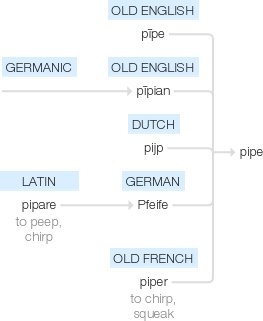Pipe
Old English pīpe ‘musical tube’, pīpian ‘play a pipe’, of Germanic origin; related to Dutch pijp and German Pfeife, based on Latin pipare ‘to peep, chirp’, reinforced in Middle English by Old French piper ‘to chirp, squeak’.
wiktionary
From Middle English pīpe, pype(“hollow cylinder or tube used as a conduit or container; duct or vessel of the body; musical instrument; financial records maintained by the English Exchequer, pipe roll”), from Old English pīpe(“pipe (musical instrument); the channel of a small stream”), [1] from Proto-Germanic *pīpǭ. Reinforced by Vulgar Latin *pīpa, from Latin pipire, pipiare, pipare, from pīpiō(“to chirp, peep”), of imitative origin.
The “storage container” and “liquid measure” senses are derived from Middle English pīpe(“large storage receptacle, particularly for wine; cask, vat; measure of volume”), from pīpe (above) and Old French pipe(“liquid measure”). [2]
The verb is from Middle English pīpen, pypyn(“to play a pipe; to make a shrill sound; to speak with a high-pitched tone”), from Old English pīpian(“to pipe”). [3]
etymonline
pipe (n.1)
Old English pipe "simple tubular musical wind instrument," also "tube for conveying water," from Vulgar Latin *pipa "a pipe, tube-shaped musical instrument" (source also of Italian pipa, French pipe, Old Frisian pipe, German Pfeife, Danish pibe, Swedish pipa, Dutch pijp), a back-formation from Latin pipare "to chirp or peep," of imitative origin.
All the tubular senses ultimately derive from the meaning "small reed, whistle." From late 14c. as "a tube or duct of the body." From mid-15c. as "one of the tubes from which the tones of an organ are produced." Meaning "narrow tubular device for smoking" is recorded by 1590s. As "the sound of the voice," 1570s.
Pipe-bomb, "home-made bomb contained in a metal pipe," is attested from 1960. Pipe-cleaner, "piece of wire coated with tufted material," is recorded from 1863. Pipe-clay "white clay suitable for making smoking pipes" is attested by 1777.
pipe (v.)
Old English pipian "to play on a pipe" or similar instrument, from Latin pipare "to peep, chirp," of imitative origin (see pipe (n.1)). Compare Dutch pijpen, German pfeifen.
From 1590s, of birds, "to chirp, warble, whistle, sing." Meaning "convey through pipes" is by 1887. Related: Piped; piping. Piping hot is in Chaucer, a reference to hissing of food in a frying pan.
To pipe up (early 15c.) originally meant "to begin to play" (on a musical instrument); sense of "to speak out" is from 1856. Pipe down "be quiet" is from 1900, probably a reversal of this, but earlier (and concurrently) in nautical jargon it was a bo'sun's whistle signal to dismiss the men from duty (1833); pipe in the nautical sense of "to call by the pipe or whistle" is by 1706.
pipe (n.2)
early 14c., "type of cask, large storage container;" mid-14c., "large vessel for storing wine," from Old French pipe "liquid measure, cask for wine," from a special use of Vulgar Latin *pipa "a pipe" (see pipe (n.1)).
